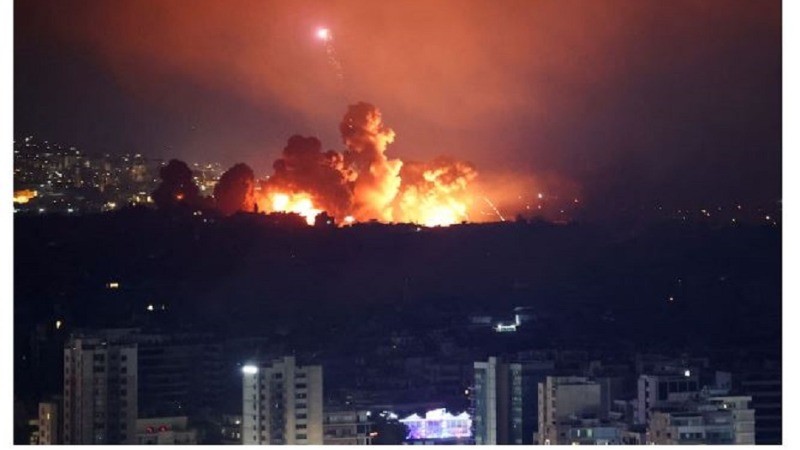
Israel Hezbollah War Live Updates: UN peacekeepers will continue their presence along Lebanon's southern border, despite Israel's request for them to vacate some positions prior to its recent ground operation, said the UN peacekeeping chief, Jean-Pierre LaCroix.
Israel Strikes Continue as Health Workers, Soldiers Among Casualties in Lebanon
World Health Organization (WHO) Director General Tedros Adhanom Ghebreyesus announced on Thursday that at least 28 health-care workers in Lebanon have been killed within the last 24 hours amid ongoing Israeli airstrikes on Beirut. Lebanon’s Health Ministry confirmed that nine more people were killed overnight in the strikes.
As the conflict escalates, Israeli forces issued evacuation warnings for several villages in southern Lebanon, signaling that the ground invasion may expand further. Lebanon’s military reported that two of its soldiers were killed on Thursday, marking the first Lebanese military casualties since the start of the Israeli ground offensive. Lebanese forces returned fire, their first direct response since the operation began.
Israel has emphasized that its ground campaign targets Hezbollah, not the Lebanese people or state. Meanwhile, Israel confirmed that one of its soldiers was killed in Lebanon on Thursday, bringing the total number of Israeli soldiers killed in the operation to nine.
LaCroix emphasized that the peacekeepers, part of the United Nations Interim Force in Lebanon (UNIFIL), remain in close contact with the Israeli Defense Force (IDF) and the Lebanese Armed Forces. He noted that this communication is essential to ensure the safety of over 10,000 peacekeepers and to maintain a vital link between the two parties. He also stressed that UNIFIL is currently the only channel of communication between Israel and Lebanon, underscoring its crucial role in protecting civilians in the conflict zone.
During a press conference, LaCroix stated that UNIFIL had anticipated Israel’s limited ground operation and discussed whether the peacekeepers should remain. Ultimately, they decided to stay, with contingency plans prepared for various scenarios, although he did not elaborate on specific outcomes. He reminded both parties of their duty to protect the peacekeepers.
The conflict escalated on Tuesday when Israeli ground forces entered southern Lebanon, marking a significant move against Hezbollah militants. The action also signified a broader confrontation with Hezbollah’s Iranian backers, following an Israeli airstrike that killed Hezbollah's long-standing leader, Hassan Nasrallah.
UNIFIL was established to oversee Israel’s withdrawal from southern Lebanon after its 1978 invasion. Its mission expanded in 2006 following the war between Israel and Hezbollah, allowing peacekeepers to patrol the Israeli border. A UN resolution following that conflict demanded the disarmament of Hezbollah and other armed groups and called for the Lebanese army to deploy along the border with Israel. Seventeen years later, neither demand has been fully implemented.
The United Nations Security Council has backed Secretary-General Antonio Guterres following Israel's criticism of his response to the escalating conflict. The council urged all member states to maintain a productive relationship with the secretary-general, warning that disengagement from the UN's leadership is counterproductive, especially amid growing tensions in the Middle East. This message came after Israeli officials declared Guterres "persona non grata," accusing him of not promptly condemning Iran's missile attack on Israel.
Iran's supreme leader, Ayatollah Ali Khamenei, is set to deliver a rare Friday sermon, marking his first in nearly five years. The sermon is expected to address the broader regional situation and may provide insight into Iran’s strategy following its recent missile attacks on Israel. The sermon will follow a ceremony in Tehran honoring Hezbollah's former leader, Hassan Nasrallah, who was recently killed in an Israeli airstrike.
The conflict also saw Israeli airstrikes targeting Hezbollah's Hashem Safieddine, one of the group’s founding members and a key figure in its political and military leadership. Safieddine, with deep ties to Iran, has long been seen as a prominent figure in Hezbollah's operations and leadership, further solidifying the group's connection to Tehran. His family’s ties to Iran were highlighted in the publicized marriage of his son to the daughter of Qassim Suleimani, the Iranian commander killed in a 2020 US airstrike.